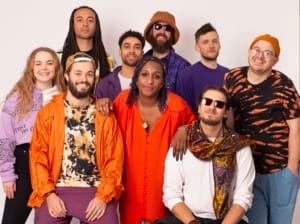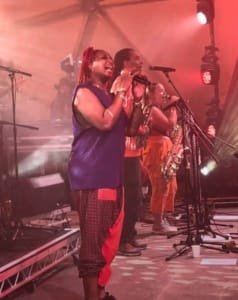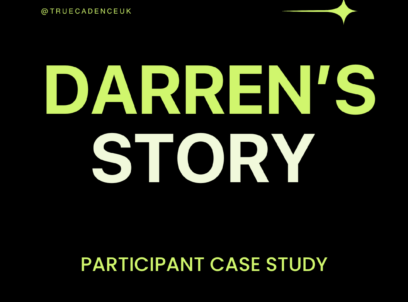UK jazz is a curious thing. With a hugely diverse range of cultural and stylistic influences, what the journalists and critics are defining as modern ‘jazz’ in this country is certainly a far-cry from the swing combos and Dixieland bands of early 20th century New Orleans.
In some ways, this label almost seems reductive. Artists are blending together musical elements and styles from a number of different cultures, and it seems like sometimes ‘UK jazz’ is used as an umbrella term for anything that sounds unusual or eclectic in its inspirations, almost as a way to simplify or disregard the rich range of influences being poured into the scene.
As the musical director of nine-piece fusion band Nubiyan Twist, one-half of afro-futurist band Onipa (alongside K.O.G), and a producer with a passion for mixing together different cultures and styles, Tom Excell sits, in many ways, at the heart of what journalists have christened ‘UK jazz’.
From their self-titled debut album in 2015 to their latest record Find Your Flame, which released in May last year, Nubiyan Twist have been at the centre of a wave of UK fusion for almost ten years. So, in this True Cadence interview and with his experiences in Nubiyan Twist as a guiding force, Tom wields his musical passion and expertise to truly lift open the curtain on all things fusion for us.
Was Nubiyan Twist always a fusion-based project, or was jazz at the start of it?
It was an amalgamation of everything that I liked listening to. I was largely influenced by my dad’s record collection which had a lot of African records, jazz, reggae, hip-hop, and some UK dance stuff. Nubiyan Twist started very much as a production project; I was just experimenting, putting different sounds together. It’s funny that those experimentations seem to have become staples of what the UK jazz scene is defined as now, but at the time it wasn’t something you heard everywhere.
I was searching for something that excited me, and I stumbled across this mix of sounds that people felt was a bit too different. The media were a bit confused as to how to define it and write about it, but fast-forward ten years and it’s understood that if you listen to a UK jazz act, there’s going to be some influence from Caribbean and African communities, and the sound system culture in this country.
I was really into mixing jazz improvisation and melodic and harmonic content with heavier groove-based music of the diaspora and dub reggae. I think we were extremely lucky that we hit a wave where mixing those styles became popular and was labelled as UK jazz, which massively helps people who enjoy experimenting around those kinds of styles. It was a good time to hit that curve of appreciation, and hopefully it will keep growing.

Could you expand on the media’s initially confused response to your sound?
It was mostly press articles saying things like ‘is it a bit of pastiche, we’re not quite sure what this is, it’s a bit confused, it would benefit from sticking to one thing’.
We’ve always prioritised our live gigs as one of the best ways for people to interact with us as a band, and I think anyone that saw us live understood it was its own thing without having to question ‘why are they referencing this style?’, or ‘why are these two things next to each other?’.
It was interesting to see the change over the years; confusion was a common response to our first album in the press, but now it seems completely accepted that all of those styles we were using fall within UK jazz.
It’s about joy, love, and connection, and that’s one of the best things about music – it helps you meet loads of people, see loads of different places, and experience loads of new things.
Did you have any particular influences in the early days of Nubiyan Twist, or were you doing something totally new?
I don’t think anything is ever new. Music is such an amazingly continuous thread, where we get passed the sounds that we’re born into and regurgitate something for the next set of listeners to be inspired by. Although we were the start of a wave that put together sounds that weren’t put together so commonly, there’s definitely massive amounts of influence to credit.
Growing up, there were producers who inspired me by being extremely open-minded in the studio. For example, Nitin Sawhney’s albums span so many styles and genres, but they all have a narrative throughout them which I really admired. Other influences included Bonobo, Quantic, and Mr. Scruff. The first Gorillaz album was an eye-opener because it jumps between so many different styles, quite jarringly at times, but it has a feel and a concept and an identity. I found myself thinking ‘these records are mixing so many different styles quite fearlessly.’
Although I don’t think what we did was new, I still enjoyed trying to combine nuanced styles that I hadn’t heard together before, experimenting like a chemist—if you put two elements together, you’re going to get some kind of reaction, and you don’t know always what it’s going to be like. There are an infinite amount of combinations, and it can be quite exciting to feel like you’re creating something unheard.
At the same time though, there’s an emphasis on what we’re doing being a new scene, a new wave, and a new sound, but actually you can go back to some ’70s Herbie Hancock records and the whole aesthetic sounds pretty similar to some of the new London jazz records. I like to try and appreciate that this scene has been inspired by a lot of amazing music. At the same time, it is an exciting scene and there’s a lot of fresh sounds coming out of it as well, so I think it’s good to be mindful of both aspects.

How do you blend together different styles, from a practical perspective?
The way my brain works is I’ll be brewing musical ideas, clocking things and thinking ‘I haven’t heard that mixed with that ever, I wonder what that would sound like?’. Quite often, I’ll have a couple of main ideas ready for when I get into the studio so I can test them out. That way, I can maximise the small amounts of time I get in the studio because I’ve already got quite a clear idea. I’ll try and smash out a couple demos of something I’ve been brewing in my brain that mixes different styles together. It might not always work, but I try not to overthink it and just go with the creativity at that moment.
If I’m writing with a friend, something might take our fancy and we’ll just go with it. Sometimes we’ll completely switch up an idea we’ve already started, and it might become a whole new thing, so I’m never set in stone when I go into the studio. Although I’ll come with a few ideas, I like to keep the process a bit more organic, and not too predetermined.
Music is such an amazingly continuous thread, where we get passed the sounds that we’re born into and regurgitate something for the next set of listeners to be inspired by.
Nubiyan Twist have collaborated with a wide range of artists throughout their discography—what inspired you to reach out to so many different artists?
During the production of our 2019 album Jungle Run, we slowly started to part ways with our original singer, so we naturally started collaborating more with different people. When we began working on our next album Freedom Fables, we didn’t feel the need to rush into finding a new permanent singer; we felt that the band lent itself really well to a collaborative studio record, so the album ended up being a bit of a showcase of lots of different singers.
Regardless of the internal lineup situation though, as a producer who has met loads of really great artists on the road I really love how the studio creates a space for collaborations you wouldn’t necessarily get to see live. You can reach out to legendary artists such as Tony Allen, or Mulatu Astatke, or Pat Thomas, who you wouldn’t see on a stage with us because they’re too busy.
Our most recent album though, Find Your Flame, has seen Aziza Jaye step in as a new permanent singer which we’re all extremely excited about—we’ve definitely found a creative and personal connection with her which has been really fruitful. The live shows have been amazing on this tour with her, but we all still enjoy inviting some collaborations onto records so I think we’ll keep doing that, perhaps less so than Freedom Fables, but it’s nice to get those connections down on record for the world to hear.
Can you pick out any key points of development in the history of Nubiyan Twist?
Jungle Run was definitely an important record because we had Tony Allen and Mulatu Astatke featured. As the forefather of afrobeat drums, Tony Allen is a huge inspiration to us, and Mulatu is one of the founding musicians of the Ethio-jazz scene as well. Having them agree to play on one of our records felt like what we’re doing as a band had been accepted by the masters themselves. They both made me feel extremely validated and welcomed to be writing in styles that they had created; their blessing really gave me confidence that it’s okay to be experimenting with these different styles that aren’t from my own culture. That was a big moment for me, and it made me feel as though we had something worthy of showing the world—a collaborative, creative vision worth all of the time that we were putting into it.
Fast-forward to this last album, Find Your Flame, and it’s been a really important few years for us as a collective. I’ve had a child, our trumpet player Jojo’s had a vital leg amputation, Aziza Jaye’s had some car accidents; we’ve been through a lot of different challenges as a group and we’ve come together to help each other through it all. There’s a really strong family connection between every member of the band, and it feels like we’ve settled into a really positive, productive, fruitful environment. Ultimately, we’ve come out of it with an album which is one of my favourites. Aziza Jaye has brought some more Patois and Jamaican culture into the music which has been really fun to explore. It really feels like the start of a fresh, exciting, and big new chapter.

Do you think it is important that music like yours exists, to bring attention to the musical styles of other cultures?
Celebrating lots of different cultures through our music comes very naturally to us; our music really comes from a deep place of love for these different cultures, and we hope to do it in a way that is respectful and enriching for society. People from different cultures often come up after our shows and tell us how important our music has been for them, that they’ve really resonated with a certain song and it’s helped them through aspects of their life.
I’d like to think that there’s something about making music for the love of the culture that shines through when people listen to us and other musicians doing a similar thing. I definitely feel like the crowds that come and listen to that kind of music are open-minded people that believe in the fundamental values of respect, unity, and togetherness. It’s important to support each other in a political landscape that’s looking quite frightening sometimes—there’s a lot of fear for the other, and some quite scary right-wing values flying around a lot of Europe and the world, so I’d like to think that this music does have some positive impacts in how it brings people together.
Do you think that use of fusion in modern music has helped to make genres like jazz more mainstream?
We play a lot of ‘jazz’ festivals (and I use inverted commas because quite often modern jazz festivals are more of an everything festival), and they really seem to be attracting massive, diverse audiences, more than they used to when we’d play at the ‘Mostly Jazz’ festival nearly ten years ago. It’s definitely become far more accessible to far more people. The popularity of jazz seems to be on the up constantly, with some quite far-out stuff becoming more mainstream, for example Thundercat’s live show at ‘We Out Here’ in 2021 attracted this huge, fully-engaged audience that you might only expect for more traditionally mainstream music. There’s been a wave of musicians exploring different avenues that are partially rooted in jazz, and the media have clocked it as a trend and spread it far and wide which has really helped to support musicians in the scene.
But I’ll leave categorising music with genres and words to the journalists—I just love it all. We’re living in an extremely interconnected society where we can listen to music from absolutely everywhere. People’s playlists and listening have become so much more eclectic than pre-streaming when you had to buy each physical album. I miss the fact that people don’t often sit and listen to a whole album anymore, but I do think it’s really amazing how broad people’s listening tastes are these days. We’re all on this planet for a very short space of time, so I kind of consider all the music being made as very interconnected. I struggle to pick it all apart with genres, but I appreciate the journalists who can do that, and help to make sense of it for people who are perhaps less engrossed in music on the whole.
…the crowds that come and listen to that kind of music are open-minded people that believe in the fundamental values of respect, unity, and togetherness.
Do you have some words of advice for people interested in becoming a performing musician?
One of the most useful things I did in terms of practice was listening to as much music as possible and playing along to all of the music that I loved. I didn’t ever really do any formal practice or scales, I just loved playing along to every single record I had at home, on whatever instrument I was holding, and that really helped me to properly internalise and digest all of the music that I loved.
Also, remember to have as much fun with it as you possibly can; don’t take it too seriously. It’s about joy, love, and connection, and that’s one of the best things about music—it helps you meet loads of people, see loads of different places, and experience loads of new things. It’s good to keep an appreciation for music as a part of life rather than just something that you go into an institution to learn about. Hear the music around you in nature, celebrate it, dance to it, just keep the fun of it there. We all have our own egos intertwined in what we do, but try and stay zoomed out and keep in mind how beautiful of a thing music really is.


